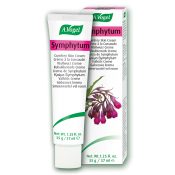A.Vogel search
When the internal search is activated, personal data such as your IP address is transmitted to our search engine Cludo. Data is thus transferred to a third country. Please click here if you want to display the internal search. You can find more information on data protection here: Privacy policy.Brittle nails and menopause
Brittle nails are one of the more unusual symptoms connected to the menopause. Most women will not equate cracked and chipping nails with their change; however brittle nails are often linked to hormonal imbalances and dehydration.
This page explores the causes and symptoms of brittle nails and menopause, and provides an array of natural solutions to alleviate them. There's also a Q&A service where you can get answers to all your questions.
Brittleness of the nails is also called onychorrhexis from the Greek derivation onycho- meaning ‘nail’ and rhexis- meaning ‘bursting.’
This is logical when you think that the main symptom or indication that you have brittle nails is when they start breaking, cracking or chipping with increasing frequency. The yellowing of nails, or nails curling at the top also suggests that they are brittle.
A substance called keratin is produced in the nail bed. As this grows, a hard substance forms and covers the tops of your fingers and toes. These are your nails, and they are there to protect the tender skin underneath.
When the body is healthy, nails are strong and evenly formed. If your nails are showing signs of brittleness, it is an indication of an imbalance in your keratin production.
At first glance, it seems strange that going through menopause could cause you to have brittle nails. However, this is the time of life when levels of hormones such as oestrogen are fluctuating, resulting in a range of unexpected symptoms.
Lack of water in your body and dehydration is most likely to cause you to have brittle nails. Oestrogen is one of the hormones that contribute to regulating water levels in your body. As you go through the menopause the levels of oestrogen in your body will continually drop, affecting your fluid balance.
There are certain measures you can take to help improve your nail health. Some simple lifestyle changes or home remedies can sometimes make all the difference.
Wearing gloves when your hands are in water, such as when doing the dishes or washing the car, can protect your nails. If your nails are submerged in water for a long time, they absorb a lot of water, then contract as they dry out, damaging your nails. This is worsened if you are using strong soap.
Your diet can have an impact on your nails. Essential fatty acids, such as those found in almonds or avocado, are important for strengthening your nails. Eating as few as 6 almonds a day may have a positive impact on your nail health.
It is important to keep hydrated as the lack of oestrogen in your body means that you cannot retain water as effectively as before.
Keeping your nails moisturised will also help. You will need to be careful which hand moisturisers you use, because some contain chemicals that can actually have the opposite effect to the one you are after, and start to dry out your nails. Instead, you could soak your nails in almond oil to help keep them soft and supple.
As this may be too time consuming to fit into your schedule, consider rubbing Comfrey Cream into your nails as a healthy and helpful moisturiser.
Herbs such as nettle and comfrey may help with brittle nails. It is thought that this is because these herbs contain useful quantities of the mineral silicon, often used to treat brittle hair and nails.
You can take Stinging nettle tincture daily and use Comfrey Cream on the nails themselves.
A.Vogel Symphytum (Comfrey) Cream – Skin hydrator
Skin cream made with Comfrey extract. Protects and nourishes tired skin. Use as day and night cream, penetrates the skin and leaves it soft. Anti-fatigue skin cream.
Ensuring that you have sufficient magnesium in your diet to allow your calcium intake to be absorbed effectively is important. If your diet doesn’t contain plenty of wholegrains, nuts, dried fruit, and seeds (good sources of magnesium) then it may be a good idea to take a supplement. Magnesium is helpful for the nervous system too, countering the tendency to anxiety that many women experience during the menopause.
You may like to consider the remedy Calcium Absorber - Urticalcin, which is made from Stinging nettle, silicea, and calcium and consists of tiny tablets that can be sucked or chewed.
Conventional medicines should really be a last resort for this symptom and often, simple changes to your lifestyle and diet or the use of supplements will negate their need. If fungal infections are the cause of the problem, then anti-fungal remedies from your pharmacy or prescribed by your doctor may be needed.
However, if you have found that nothing has helped, it may be that there is an underlying cause such as low thyroid function or anaemia. In these cases it is worth visiting your doctor, as treating any such underlying cause would be important for more than just your nail condition.
A.Vogel Blog – Natural and Healthy
Inspiration for a healthy life!





